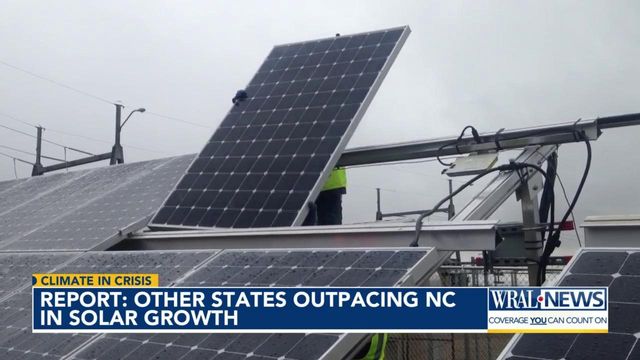Other states outpacing NC in solar power growth, report shows
North Carolina ranks fourth in the country for total solar energy capacity, according to a new Solar Market Insight Report from the Solar Energy Industries Association (SEIA).
"We just had the biggest third quarter that we've ever had in our history," said Abigail Ross Hopper, President and CEO of the Solar Energy Industries Association.
Nationwide, the report shows that 2023 is expected to be a record year, with the solar industry growing by 55% compared to last year.
After climbing to No. 2 in the nation by 2017, North Carolina is projected to be 28th for solar growth over the next five years.
Matt Abele with the North Carolina Sustainable Energy Association says growth has slowed in the state, in part, because renewable energy sources aren't as profitable for utilities as other forms of energy generation.
"So, you see them naturally select other resources, like small modular nuclear reactors, which could potentially cost lots and lots of money for ratepayers, because that means more money on their bottom line and more profits for their shareholders," Abele said.
Randy Wheeless with Duke Energy says the utility plans to double its solar capacity over the next decade.
"We have had slow and steady growth," Wheeless said. "You can only build it so fast. There are planning and zoning hurdles. We have to go through the process, just like any power plant."
Abele says recent state-mandated annual caps on solar deployment and infrastructure challenges have also slowed down clean energy growth.
"Where the wind blows and the sun shines best is not always exactly where we built power plants before, so we might need to move that electricity over longer distances and build more transmission lines," said Joshua Rhodes, a research scientist at the University of Texas Austin who specializes in energy consumption and distribution.
It is still expected to be a record year for solar, and the clean energy industry employs more than 105,000 people in North Carolina.
The report shows the price of solar in the state has fallen by 43% over the past 10 years and is the cheapest form of energy generation.
"More renewable energy sources would cut costs for ratepayers," Abele said.
Last year, the two Duke providers in North Carolina made nearly $3 billion in net income.
The utilities commission approved rate increases for Duke Energy customers that took effect in October.
A customer using 1,000 kilowatt hours would see their bill jump from about $144 per month to $162 per month over the next two years.











